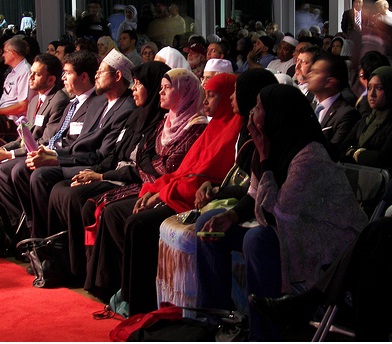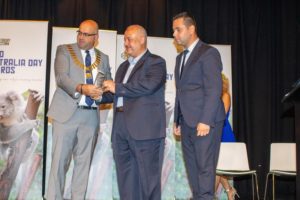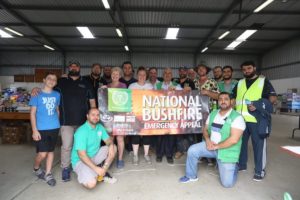
July 9 2010
CNN’s Soraya Salam attended this year’s Islamic Society of North America Convention in Rosemont, Illinois and sent this report.
Clusters of radiantly vibrant tunics and headscarves, skullcaps and flowing robes and smiling children holding anxious hands filled a major street in Chicago last weekend as over 30,000 Muslim Americans made their way towards the Rosemont Convention Center for the 47th annual Islamic Society of North America (ISNA) convention.
The four-day event included lectures, art, entertainment, networking events, a film festival, and sessions with leaders from the Islamic community and beyond. The theme this year was “Nurturing Compassionate Communities: Connecting Faith and Service.”
“Our convention is one of the most recognizable aspects of American Muslim culture… it has become a kind of institution in American Islam,” said ISNA President Ingrid Mattson.
Considered a time for Muslims across the continent to come together out of a common hunger for knowledge and new friends, some participants also felt that the gathering strengthened their faith and identity.
“I don’t feel like there’s always a place for me here, said Robert Polzin, a sophomore at Missouri’s St. Louis Community College at Meramec. “Conferences like this really make me feel stronger in my faith and that there is a place for me, and that I can contribute and just be a valuable asset to this community.”
Others referred to the event as a “mini Hajj” in America for Muslims, and whether or not such a label is appropriate, one message was clear both in spirit and in mention: for the Muslim community here, unity does not have to mean uniformity.
Aside from the popular bazaar, with over 500 booths of eclectic collections of clothing, jewelry, art, prayer rugs and books, the main focus of the convention was on lectures dealing with both Islamic-themed topics and sessions on environmental, political, and social issues.
There were female leaders who spoke of the importance of following one’s passions and leaving a legacy of positive influence, faith leaders who detailed the significance of forming interfaith partnerships and imams who recounted the Prophet Mohammed’s example of kindness to be applied in one’s own dealings with people on a daily basis.
Yasir Qadhi, a popular scholar and speaker, discussed valuable lessons from the compassionate and merciful life of Jesus, considered a beloved prophet of God in Islam.
In a session entitled “Media, Perception and Social Influence: The Role of Entertainment in Social Movements,” Muslim producers, comedians, and entertainers stressed the importance of seeking careers in the media. Comedian Dean Obeidallah stressed that Muslims love to laugh and that they should engage the entertainment business in the United States more. The Arab-American’s brilliant idea? A James Bond that shares his heritage: “Could you imagine? ‘My name is Abdullah. Abdullah Abdullah.’ ”
Other sessions dealt with politics. Three Americans aboard the boat that was raided by Israel en route to Gaza in May told of their experiences and insisted that they wanted peace and prosperity for both Palestinians and Israelis.
The highlight of the convention was Saturday night’s main session, featuring high-profile speakers like world-renowned intellectual Tariq Ramadan, Ingrid Mattson, Sheikh Hamza Yusuf and Ali Gomaa, the Grand Mufti of Egypt, one of the highest spiritual leaders in Sunni Islam.
Attendees waited outside of the main hall to get the best of the thousands of seats in the house, and when the entrances opened, hundreds of people, mostly younger men and women, ran towards the front of the stage. It was an unusual sight for 21st century America: a palpable enthusiasm–not over a scantily clad singer or dancer nor a particular boy-turned-buff werewolf–but for religious figures.
Ramadan spoke of the importance of maintaining humility and compassion on one’s quest towards both inner and outer peace. “Help all the poor people, non-Muslims and Muslims…they are our brothers and sisters in humanity,” he said.
He also spoke of respecting others’ views and opinions: “Tawbah [repentance] starts with sincerity, not judgment.”
Mattson described the compassion she has experienced from her local Muslim community over the years, while Yusuf energized the audience with his call for Muslims to emphasize education. Gomaa discussed the importance of attaining God’s mercy by showing mercy to others on earth.
For many participants, though, the weekend was more about being around thousands of people who shared the same dedication and way of life, cheering and clapping and exclaiming “Allahu akbar! (God is Great!)” in unison. It was about transforming a minority group of individuals into the majority for a mere weekend, and celebrating the identity that binds them.





